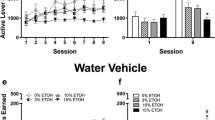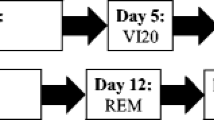Abstract
Previous studies of ethanol reinforcement in BALB/cJ and C57BL/6J mice have shown that over a range of concentrations oral ethanol appeared to serve as a reinforcer only for the C57BL/6J mice. In the previous studies BALB/cJ mice maintained rates of responding for ethanol that only slightly exceeded the rates maintained by the vehicle, water. However, the quantity of ethanol consumed with the continuous reinforcement schedule (fixed ratio one) may have led to pharmacologically significant effects, given the high sensitivity to ethanol of this genotype. The present study tested whether and to what extent ethanol would maintain responding under increasing fixed ratio size in these two strains of mice at ethanol concentrations of 0%, 8%, and 16% (w/v). For the C57BL/6J mice, as fixed-ratio size increased from 1 to 2, 4, and 8, there were almost directly proportional increases in response rate at ethanol concentrations of 8% and 16% (w/v), but not at 0%. Post-session blood ethanol levels confirmed intake of pharmacologically significant quantities. The volume consumed per unit of body weight decreased as fixed-ratio size increased. For the BALB/cJ mice, at no condition did ethanol maintain responding at levels that significantly exceeded vehicle maintained responding. BALB/cJ mice did not differ from C57BL/6J mice as fixed-ratio size was increased during vehicle conditions. These results, along with earlier findings, demonstrate that ethanol can serve as a reinforcer for C57BL/6J mice but not in BALB/cJ mice over a range of schedule conditions. They further support the conclusion that genotype is an important determinant of ethanol reinforced behavior.
Similar content being viewed by others
References
Beardsley PM, Meisch RA (1981) A precision drinking device for rats tested with water, etonitazene, and ethanol. Pharmacol Biochem Behav 14:871–876
Carroll CE, Meisch RA (1984) Increased drug-reinforced behavior due to food deprivation. In: Thompson T, Dews PB, Barrett JE (eds) Advances in behavioral pharmacology, vol 4. Academic press, New York, pp 47–88
Carroll CE, France CP, Meisch RA (1978) Intravenous self-administration of etonitazene, cocaine and phencyclidine in rats during food deprivation and satiation. J Pharmacol Exp Ther 217:241–247
Carroll CE, Peterson MC, Harrison RG (1986) Food-deprivation reveals strain differences in opiate intake of Sprague-Dawley and Wistar rats. Pharmacol Biochem Behav 24:1095–1099
Crabbe JC, McSwigan JD, Belknap JK (1985) The role of genetics in substance abuse. In: Galizio M, Maisto SA (eds) Determinants of substance abuse: biological, psychological, and environmental factors. Plenum Press, New York, pp 13–64
Dole VP, Ho A, Gentry RT (1985) Toward an analogue of alcoholism in mice: criteria for recognition of pharmacologically motivated drinking. Proc Natl Acad Sci USA 82:3469–3471
Elmer GI, Meisch RA, George FR (1986) Oral ethanol reinforced behavior in inbred mice. Pharmacol Biochem Behav 24:1417–1421
Elmer GI, Meisch RA, George FR (1987a) Differential concentration-response curves for oral ethanol self-administration in C57BL/6J and BALB/cJ mice. Alcohol 4:63–68
Elmer GI, Meisch RA, George FR (1987b) Mouse strain differences in operant self-administration of ethanol. Behav Genet 17:439–451
George FR (1987) Genetic and environmental factors in ethanol self-administration. Pharmacol Biochem Behav 27:379–384
George FR, Meisch RA (1984) Oral narcotic intake as a reinforcer: Genotype x environment interactions. Behav Genet 14:603
Goldberg SR (1973) Comparable behavior maintained under fixed-ratio and second-order schedules of food presentation, cocaine injection ord-amphetamine injection in the squirrel monkey. J Pharmacol Exp Ther 186:18–30
Goldberg SR, Kelleher RT (1976) Behavior controlled by schedules of cocaine injection in squirrel and rhesus monkeys. J Exp Anal Behav 25:93–104
Goodwin DW (1980) The genetics of alcoholism. Subst Alcohol Actions Misuse 1:101–117
Gottesman II, Carey G (1983) Extracting meaning and direction from twin data. Psychiatr Dev 1:35–50
Henningfield JE, Meisch RA (1976) Ethanol as a positive reinforcer via the oral route for rhesus monkeys: maintenance of fixed-ratio responding. Pharmacol Biochem Behav 4:473–475
Henningfield JE, Meisch RA (1978) Ethanol drinking by rhesus monkeys as a function of concentration. Psychopharmacology 57:133–136
Henningfield JE, Ator NA, Griffiths RR (1981) Establishment and maintenance of oral ethanol self-administration in the baboon. Drug Alcohol Depend 7:113–124
Kakihana R, Brown DR, McClearn GE, Tabershaw IR (1966) Brain sensitivity to alcohol in inbred mouse strains. Science 154:1574–1575
Karoly AJ, Winger G, Ikomi F, Woods JH (1978) The reinforcing property of ethanol in the rhesus monkey. Psychopharmacology 58:19–25
Lemaire GA, Meisch RA (1984) Pentobarbital self-administration in rhesus monkeys: drug concentration and fixed-ratio size interactions. J Exp Anal Behav 42:37–49
Lemaire GA, Meisch RA (1985) Oral drug self-administration in rhesus monkeys: interactions between drug amount and fixed-ratio size. J Exp Anal Behav 44:377–389
Lumeng L, Waller MB, McBride WJ, Li T-K (1982) Different sensitivities to ethanol in alcohol-preferring and -nonpreferring rats. Pharmacol Biochem Behav 16:125–130
Malila A (1978) Intoxicating effects of three aliphatic alcohols and barbital on two rat strains genetically selected for their ethanol intake. Pharmacol Biochem Behav 8:197–201
Martin PR (1981) The human genetics of alcoholism. Subst Alcohol Actions Misuse 2:389–406
McClearn GE, Rodgers DA (1961) Genetic factors in alcohol preference of laboratory mice. J Comp Physiol Psychol 54:116–119
McClearn GE (1968) Genetics and motivation of the mouse. In: Arnold WJ (ed) Nebraska Symposium on Motivation. University of Nebraska Press, Lincoln Nebraska, pp 47–83
Meisch RA (1975) The function of schedule-induced polydipsia in establishing ethanol as a positive reinforcer. Pharmacol 27:465–473
Meisch RA (1977) Ethanol self-administration: infrahuman studies. In: Thompson T, Dews PB (eds) Advances in behavioral pharmacology, vol 1. Academic Press, New York, pp 35–84
Meisch RA (1984) Alcohol self-administration by experimental animals. In: Smart RG, Cappell HD, Glaser FB, Israel Y, Kalant H, Popham RE, Schmidt W, Sellers EM (eds) Research Advances in Alcohol and drug problems, vol 1. Plenum Press, New York, pp 23–45
Meisch RA, Henningfield JE (1977) Drinking of ethanol by rhesus monkeys: experimental strategies for establishing ethanol as a reinforcer. In: Gross MM (ed) Alcohol intoxication and withdrawal, vol 3 B. Plenum Press, New York, pp 443–463
Meisch RA, Thompson T (1973) Ethanol as a reinforcer: effect of fixed-ratio size and food deprivation. Psychopharmacologia 28:171–183
Meisch RA, Thompson T (1974) Ethanol intake as a function of concentration during food deprivation and satiation. Pharmacol Biochem Behav 2:589–596
Meisch RA, Kliner DJ, Henningfield JE (1981) Pentobarbital drinking by rhesus monkeys: establishment of pentobarbital reinforced behavior. J Pharmacol Exp Ther 217:171–183
Moreton JE, Meisch RA, Stark L, Thompson T (1977) Ketamine self-administration by the rhesus monkey. J Pharmacol Exp Ther 203:303–309
Ritz MC, George FR, deFiebre CM, Meisch RA (1986) Genetic differences in the establishment of ethanol as a reinforcer. Pharmacol Biochem Behav 24:1089–1094
Rodgers DA, McClearn GE, Bennett EL, Hebert M (1963) Alcohol preference as a function of its caloric utility in mice. J Comp Physiol Psychol 56:666–672
Roehrs TA, Samson HH (1981) Ethanol reinforced behavior assessed with a concurrent schedule. Pharmacol Biochem Behav 15:539–544
Samson HH, Roehrs TA, Tolliver GA (1982) Ethanol reinforced responding in the rat: a concurrent analysis using sucrose as the alternate choice. Pharmacol Biochem Behav 17:333–339
Segovia-Riquelme N, Vitale JJ, Gegsted DM, Mardones J (1956) Alcohol metabolism in drinking and non-drinking rats. J Biol Chem 223:299–403
Spealman RD, Goldberg SR (1978) Drug self-administration by laboratory animals: control by schedules of reinforcement. Annu Rev Pharmacol Toxicol 18:313–339
Suzuki T, George FR, Meisch RA (1988) Differential establishment and maintenance of oral ethanol reinforced behavior in Lewis and Fischer 344 inbred rat strains. J Pharmacol Exp Ther 245 (in press)
Waller MB, McBride WJ, Gatto GJ, Lumeng L, Li T-K (1984) Intragastric self-infusion of ethanol by ethanol-preferring and nonpreferring lines of rats. Science 225:78–80
Author information
Authors and Affiliations
Rights and permissions
About this article
Cite this article
Elmer, G.I., Meisch, R.A., Goldberg, S.R. et al. Fixed-ratio schedules of oral ethanol self-administration in inbred mouse strains. Psychopharmacology 96, 431–436 (1988). https://doi.org/10.1007/BF02180019
Received:
Revised:
Issue Date:
DOI: https://doi.org/10.1007/BF02180019




